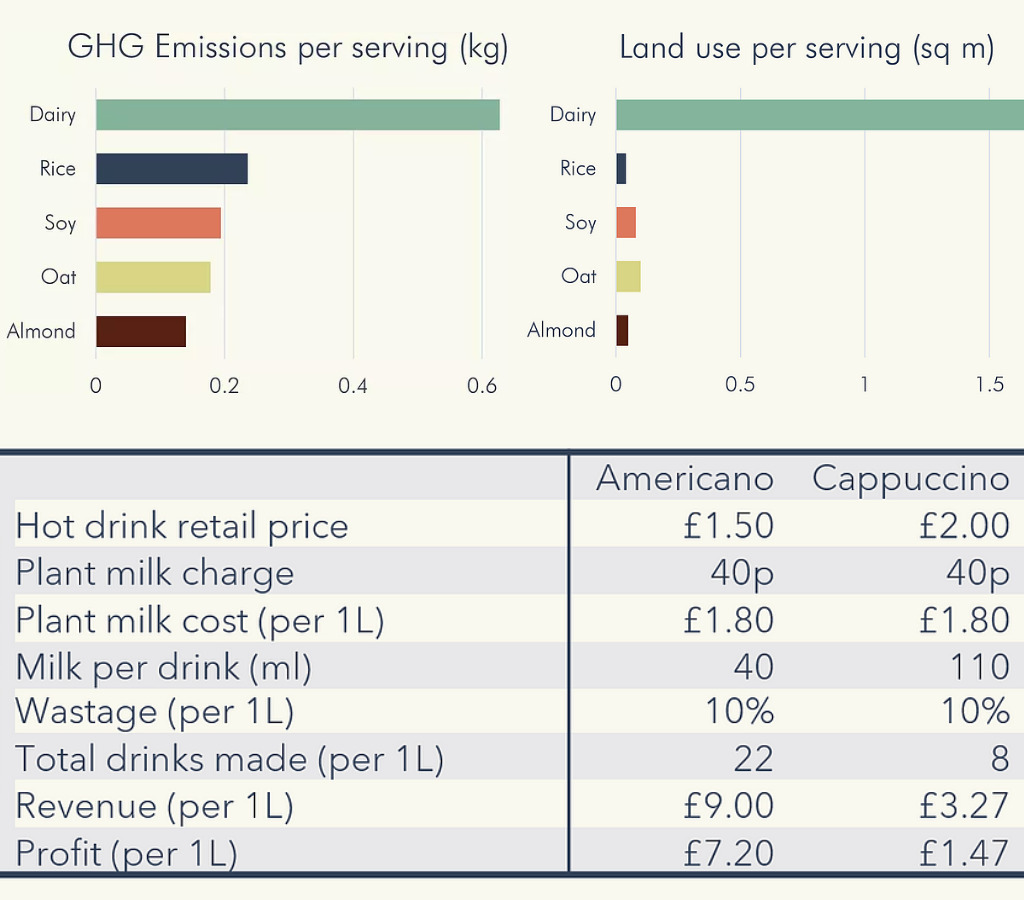Free4DairyFree: Non Profit Campaign Seeks To End Surcharge On Plant-Based Milk At U.K. Coffee Shops
4 Mins Read
Free4DairyFree has started a campaign to sustainably end the extra charges applied on plant-based milk alternatives at cafés, coffee shops, and other U.K. retailers.
Launched by Manchester-based Nicole McCulloch and George Bloor, Free4DairyFree is a not-for-profit that calls on coffee shops and retailers in the U.K. to remove surcharges on plant based milk alternatives like coconut, soy, almond among others.
Across the U.K., several cafés apply extra charges of up to GBP 0.50 (US$0.69) on plant-based milk options which is then added to the cost of the barista drink and this discourages consumers to try these options and instead settle for the conventional milk ones.
In an interview with Vegan Food and Living, Bloor said that that if we want everyone to switch to plant-based options, we need to have certain measures in place to help people make the switch. “The campaign was born from a belief that removing charges for plant milk is fundamentally the right decision for everyone involved. The tide has already turned in favour of plant milk. It’s not a case of whether more people turn to them, it’s simply a case of when.”

The campaign was born from a belief that removing charges for plant milk is fundamentally the right decision for everyone involved. The tide has already turned in favour of plant milk. It’s not a case of whether more people turn to them, it’s simply a case of when
George Bloor, co-founder, Free4DairyFree
A study on global attitudes to climate change showed that 66% of UK residents (68% globally) understand that climate change can be a major threat to their way of life and are looking to align with companies that recognize this.
According to another study by Oxford University, data shows that drinking just one glass of dairy milk daily for a year requires the equivalent of 585 miles of driving emissions, 703 showers, and 7,000 sq ft of land, more than 10x required for the same amount of oat milk.
Coffee chains like Costa have temporarily removed charges for non-dairy milk in the past and Free4DairyFree aims to make this move permanent and sustainable so that more businesses can easily remove these charges.
For this purpose, the team has developed an F4DF Charter which is a public commitment where the retailers can sign up and the only requirement is providing plant-milk to customers free of charge thus showing their support for the plant-based sector.
Once the charter is signed, the retailers agree to three principles laid out by the charter – plant milk is free, you support sustainability in the retail sector and you support the progressive reduction of global dairy consumption.
McCulloch explained that over time, they expect the F4DF Charter to become a statement and standard with which industry and consumers can recognise and resonate with.
The team understands that due to certain financial constraints, small independents will face issues in removing the extra charges and as a result, the campaign has proposed innovative solutions, for instance, the F4DF Delivery concept presenting a cost-effective pathway. This concept goes through four stages: First, you place your weekly order. Then the F4DF team buys the high-quality plant milk in bulk and then on a weekly basis, they deliver your plant-milk order to your premises. Lastly, your customers enjoy free plant-based milk.
McCulloch also added that Free4DairyFree understand that industry collaboration is absolutely critical”: “The only way we’re going to affect real change is by listening and taking into account everyone’s perspectives on the issue.”
In the wake of the coronavirus, consumers have increasingly shifted to plant-based options and thanks to the dairy-free trend, this has resulted in a huge blow to the dairy industry.
Recently, Borden Dairy became the second major American cow’s milk producer to file for bankruptcy, referencing “market challenges” brought on by the dairy-free trend and in New Zealand, Fonterra, the world’s largest dairy exporter, witnessed its second year of losses in a row.
While dairy sales have drastically fallen, the sales of plant-based alternatives such as oat milk has risen sharply by an astonishing 636% between 2018 and 2019.
However, if we want to avoid irreparable climate damage, dairy production must be reduced by 50% by the year 2050.
You can sign Free4DairyFree’s petition here.
Lead image courtesy of Free4DairyFree.



